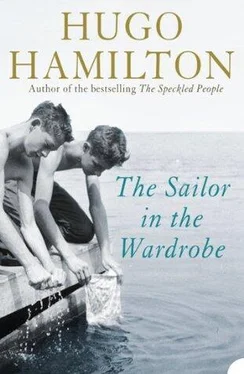One night in Tigh Fitz, Packer got talking to a Dutch girl who was staying on the island for the summer. She had been in a motorbike accident and had a plaster cast around her leg, sitting on the bench in the pub with her painted toes sticking out the other end. Packer was able to tell her that he had also been in a motorbike accident and had his leg in plaster for months. She was so beautiful that everyone wanted to talk to her and tell her any amount of lies. They watched her painted toenails twiddling around and told jokes and stories. The old men wound her hand around as they sang songs, but it was Packer who finally got his arm around her and helped with her crutches to make sure she didn’t fall over when she was leaving.
The following day, we all went walking up to an ancient church above Killeany. We climbed the hill beyond the cottages with the Dutch girl and Packer following some distance behind us. She was wearing a red tartan skirt which flapped in the wind every now and again. Sometimes Packer called one of us back to carry her across the rocks. At the monastic ruin of Teampall Bheannáin , the breeze frequently revealed the entire stump of plaster. We looked at the crumbling walls covered in yellow lichen and understood for a brief moment how ancient this place was. Everybody was mostly keeping an eye on the Dutch girl and watching how Packer was talking to her.
On the way back through Killeany that afternoon, we came walking by the cottages and saw hundreds of salted fish laid out along the walls to dry. Each one of the cottages had fishing implements outside, lobster pots, oars, and buoys. At the harbour, we saw some men and dogs sitting around on the small pier and I looked for a long time at them, comparing everything with our own harbour.
We carried on walking past the cottages with Packer and the Dutch girl in front of us. The crutches were clicking slowly along the road, making it sound like a hospital ward in the open air. Now and again she stopped to take the weight off her hands, hopping around for a moment on her good leg and falling into Packer with her arms around him, looking back at us with a big smile and brown eyes. At one of the cottages, there was an old woman leaning at the gate, looking out at the sea and watching the slow procession going past. She began talking to us in Irish, first of all saying it was a fine day to be walking and doing nothing. She wanted to know where the girl was from and what happened to her leg. I explained that she had broken her leg in a motorbike accident and that she was staying on the island until the leg healed, before she went back to Amsterdam. The old woman began to laugh, saying there was not much to do on the island for a young woman with a plaster on her leg.
By now Packer and the Dutch girl had already moved ahead along the road, while we were still listening to the old woman and answering her provocative questions with shrugs and smiles. She asked us why we had no girlfriends and what was wrong with all the island girls walking up and down the road, day and night, with no crutches.
The old woman smiled. She was looking at us with humorous idleness, leaning lazily with her elbow on the wall. We could see the ancient teeth left over in her mouth and the deep lines across her face. We could see the marks of the weather and the wind and the rain around her sunken cheeks, but underneath, she had the expression of a young Killeany girl. Nothing could hide the mischief in her eyes as she watched us drifting away, calling out a final exhortation in Irish behind us.
‘Scaoil amach an deabhailín,’ she said with a wink. Let out the little divileen.
It took us a while to work out what exactly she meant. We began to understand why we felt the world had been turned around for us. It was not just the direction of the sunlight. We had been misinformed by the landscape and all its lonely features, because all the things we had expected to come from London, from Europe, were found here on the Aran Islands in great plenty.
‘Let out the little deabhailín,’ Packer kept saying on the train home as if we were going to follow the old woman’s advice for the rest of our lives. It was his new phrase, the Irish for shift. He was the leader of the great expedition and he repeated the words like a souvenir all the way back to Dublin.
When we got down to the harbour again, everything in the world was turned back around, a hundred and eighty degrees. Dan Turley was full of muttering rage, not only at us abandoning him, but at the fact that another boat had gone missing and this time not even been recovered. Dan had to get somebody to drive him down the coast, checking in all the different harbours halfway to Wexford, without finding anything.
‘I know who it is,’ he kept repeating. ‘I know the bastard.’
Dan said it was always his boats that were missing, not Tyrone’s. And that said everything. By now the harbour boys had turned the place into a courtroom. They looked at everyone with suspicion, just like Dan, saying things about them that they had heard from other people. They collected gossip, lots of things that had nothing to do with missing boats at all. They were like the harbour conscience, like a jury muttering through the side of their mouths. They saw the schoolteacher and said she was having it off with the trawler man. They noticed his van parked outside her house, and how it meant her husband was away on business. They knew a man from the hill who came down to the harbour and said he was looking for planning permission to build apartments along the top of the cliff behind the harbour. How much did he have to pay in bribes in order to clutter up the most scenic place along the coast with ugly apartments, they kept whispering. Every new car, every wedding, every death, every accident and every drunk driving charge was discussed at the harbour.
Packer said we were going to help Dan to find the person who was stealing the boats. His idea was that we would stay out all night and keep a kind of vigil at the harbour. The harbour vigilantes, he called us, without telling the rest of the harbour lads or even Dan.
I had to sneak out the bedroom window after everyone had gone to sleep and cross over the roof with the beehives, down onto the wall and away around the back lane. My mother told me to put a schoolbag and extra pillows into my bed to make it look like I was asleep. She was helping me escape. At the harbour, I could not see Packer anywhere at first and he only stepped out from the shadow beside Dan’s shed when I started calling him in a whisper. He had already decided where we were going to hide. He said we would sit in one of the boats, the best place to stay unnoticed. They would never accuse us of stealing the boats because we had been away in the Aran Islands.
We got out to one of the boats and settled down. He had two cans of beer and I had brought sandwiches that my mother made. Packer was annoyed when he realized that my mother knew about me staying out all night.
‘Jesus. I don’t believe it,’ he said.
But I told him it was alright, my mother knew how to keep a secret. And she wasn’t told about the whole vigilante idea. In any case, we were just sitting in the boat for hours, not doing anything against the law, just whispering. Packer was talking about the Dutch girl, saying he had got a letter from her asking him to come and visit her in Amsterdam. Then we listened to the sound of the water underneath the boats, and some of the masts clanging. The boats were moving back and forth, shifting around us like cattle in a barn. At one point, we saw the patrol car passing on the road, slowing down for a moment before it went out of sight around by the castle. But we didn’t care that nobody came, because we liked being out at night when everyone else was asleep.
Читать дальше
Конец ознакомительного отрывка
Купить книгу












